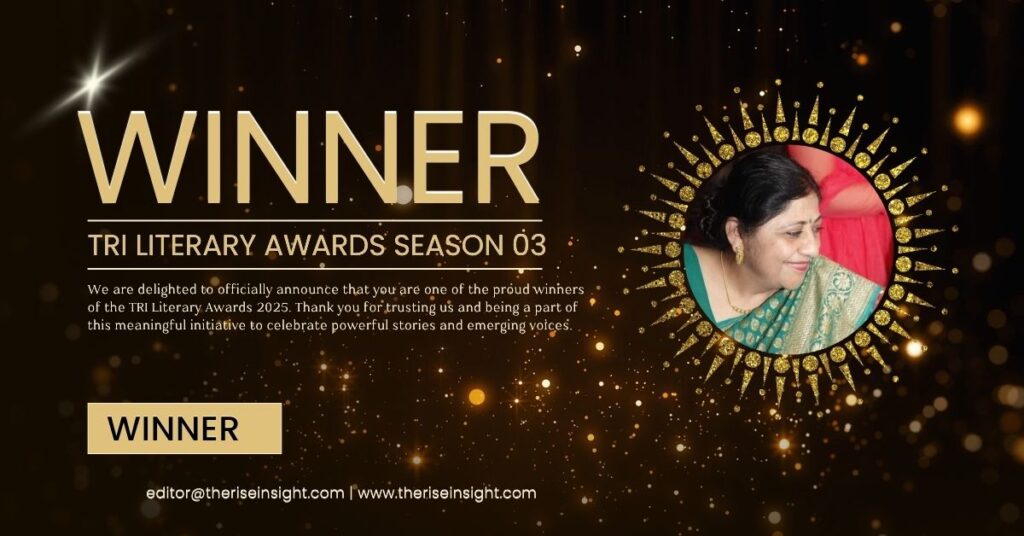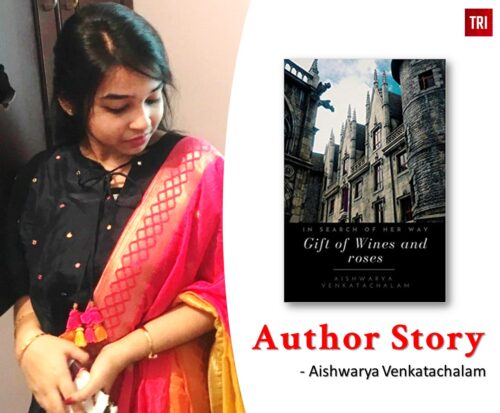
The Rise Insight proudly celebrates your literary brilliance and heartfelt contribution to contemporary Indian poetry. Your journey from the culturally rich lanes of Allahabad to the creative spaces of Guwahati, Kanpur, and Delhi echoes profoundly through the pages of your book. Just Walk With Me is not just a title—it is an invitation into the soul of a writer who observes life through a deeply poetic and emotionally intuitive lens.
Table of Contents
ToggleBook Review: Just Walk With Me by Manjri Sinha
In a world increasingly driven by speed, noise, and disconnection, Manjri Sinha’s poetry collection Just Walk With Me emerges like a quiet stream—flowing, reflective, and refreshingly genuine. It doesn’t clamor for attention, yet it touches you deeply with its simplicity, sincerity, and evocative grace. As a reader and reviewer, stepping into this book felt less like reading and more like being invited into the warm, inner world of a woman who sees life not as a grand event, but as a series of intimate, memorable moments worth preserving in verse.

A Journey in Verses: Walking Alongside the Poet
Right from the opening pages, one senses that this isn’t just a book of poems. It is a diary of emotions, memories, and moments distilled into lyrical reflections. Manjri Sinha (writing as Manjusha) doesn’t try to be ornamental or cryptic—she chooses clarity and honesty. Each poem feels like a personal conversation with a close friend or a long-lost memory brought to life.
Her verses do not shout for attention. Instead, they whisper truths—some painful, some joyous, many nostalgic. Her poetic voice is steeped in warmth, maturity, and a quiet resilience that speaks of someone who has not only lived through the many phases of life but has reflected deeply upon them.
Themes: Nature, Nostalgia, and the Nuances of Human Emotion
One of the most endearing qualities of Just Walk With Me is the breadth of its emotional landscape. Manjri Sinha’s poems speak of everyday experiences—a blooming garden, the comfort of a loved one, the ache of longing, the strength found in small victories. Yet, in their ordinariness, she finds extraordinary beauty.
Her love for nature is evident. Much like her passion for gardening, her poems cultivate emotions patiently. She draws vivid imagery from the natural world—flowers, rain, changing seasons—which serve as metaphors for emotional states. Just like a skilled gardener who knows when to nurture and when to let things grow wild, she balances structure with spontaneity in her poems.
Relationships form the emotional nucleus of her poetry. Whether it is familial bonds, friendships, or romantic connections, she portrays them with sensitivity and depth. She is particularly gifted at evoking that gentle ache that comes from remembering people who shaped us, moments that passed too quickly, or dreams that remained unspoken.
The Poet’s Voice: Sincere, Soulful, and Unfiltered
What sets Manjri Sinha apart is her voice. It’s mature yet unburdened by cynicism. There’s a graceful acceptance of life’s imperfections, an acknowledgment that pain and joy are not opposites but part of the same continuum.
Her writing is deeply rooted in the Indian sensibility—culturally grounded yet emotionally universal. There are echoes of classical poetic traditions, but also a refreshing modernity in her worldview. She is a woman who has seen life in its many hues, and her poems reflect that wide spectrum of experience.
Her use of language is simple yet elegant. She avoids poetic flamboyance, choosing instead the honest word, the relatable image, the sincere feeling. And that is perhaps why her words connect so instantly—they do not try to impress, they simply express.
Personal Reflections: Reading Her Is Like Looking in a Mirror
Reading Just Walk With Me felt like being gently reminded of the quiet joys we often overlook—the scent of earth after rain, the smile of a child, the bittersweet memory of a farewell, the comfort of an old song. Manjri’s poems are mirrors—held up to the heart. They make you pause, reflect, and sometimes, heal.
One poem reminded me of a late evening walk with my mother. Another felt like the ache of seeing an old friend after years. There is nostalgia in every line, but also hope. Even when she writes of sorrow or solitude, there is always a sense of moving forward—of walking on.
Celebration of the Everyday Woman
Perhaps the most remarkable aspect of Just Walk With Me is how it elevates the voice of the everyday woman. Manjri Sinha does not write from ivory towers; her world is one we recognize—filled with chores, conversations, kitchen aromas, garden soil, and heartfelt laughter. Yet, through her poetry, she reclaims this world as a site of beauty, agency, and emotional richness.
In a literary landscape that often chases abstraction or dramatization, her grounded, observational style is refreshing. She does not shy away from emotions or pretend detachment. She owns her experiences—both pain and pleasure—with grace and honesty.
A Voice That Deserves to Be Heard, Felt, and Celebrated
With Just Walk With Me, Manjri Sinha has gifted us a collection that doesn’t demand attention but earns it—with its heart, honesty, and human depth. It is not just poetry you read—it is poetry you live through.
It is no surprise, then, that this heartfelt work has received the TRI Literary Award – Season 3. This recognition is not just a celebration of her book, but a celebration of the quiet strength, reflective wisdom, and poetic grace that Manjri Sinha embodies through her words.
Here is review from each of the nine reviewers after reading Just Walk With Me by Manjri Sinha:
1. Prashant Sahu:
Just Walk With Me is a gentle reminder that poetry does not always have to be complex to be profound. Manjri Sinha’s voice is that of a seasoned observer—quiet yet insightful, emotional yet composed. Each poem resonates with lived experience and feels like a journal entry from a friend who’s inviting you into her world of introspection and warmth.
2. Sameer Gudhate:
What struck me most about this collection is its emotional honesty. Manjri Sinha does not wear a mask; her poems are unfiltered glimpses into a heart that has known love, longing, loss, and hope. The simplicity of her language makes her poems deeply relatable, yet they carry immense depth.
3. Apeksha Gupta:
Reading this book was like sitting under a neem tree on a summer afternoon—soothing, reflective, and full of nostalgia. I was particularly touched by how Manjri draws from nature and personal relationships to create poetry that heals. Her voice is that of every woman who has loved deeply and lived fully.
4. Akansha Sinha:
Manjri Sinha’s Just Walk With Me walks with you long after you’ve turned the last page. The beauty of her work lies in how she embraces vulnerability with dignity. She captures everyday emotions with remarkable clarity, and in doing so, offers comfort to readers navigating similar feelings.
5. Glenville Asbhy:
The poems have a soulful cadence that reminds me of classical Indian poetic traditions, yet there’s a refreshing modernity in her themes. Manjri’s ability to find poetry in the mundane, to celebrate both joy and melancholy without artifice, speaks to her authenticity as a writer.
6. Pooja Sahu:
Each page of this book felt like a conversation with a wise, empathetic friend. Manjri’s poems are reflections of a life well-lived and thoughtfully examined. Her love for relationships, her belief in celebrating life, and her sensitivity toward emotional details are the book’s greatest strengths.
7. Versha Singh:
This book is poetry for the heart and soul. Manjri Sinha paints pictures with her words—soft, serene, and yet striking. I was moved by how she turns personal stories into universal truths. Her words have the power to soothe and inspire, all at once.
8. Shivangi Yadav:
As someone who appreciates poetry rooted in real experiences, Just Walk With Me felt incredibly authentic. Manjri’s poems speak of resilience, everyday beauty, and the strength found in silence. Her connection to nature and her emotional sensitivity shine through every verse.
9. Kavita Kaushik:
Reading Just Walk With Me is like going on a journey within. Manjri Sinha’s poetry is introspective without being indulgent, simple yet layered. She captures the emotional fabric of life—its threads of love, pain, and celebration—with such grace that you feel seen, understood, and uplifted.
Final Thoughts: More Than a Book—A Companion
If you are a reader who enjoys poetry that speaks plainly yet profoundly, that reflects life rather than escapes it, then Just Walk With Me will feel like a companion. It will sit beside you on rainy afternoons, accompany you on long walks, and echo in your heart during moments of solitude.
Congratulations once again, Manjri Sinha, for this well-deserved honor. Your poetry reminds us that even in the quietest corners of our lives, there is rhythm, rhyme, and reason worth celebrating.




